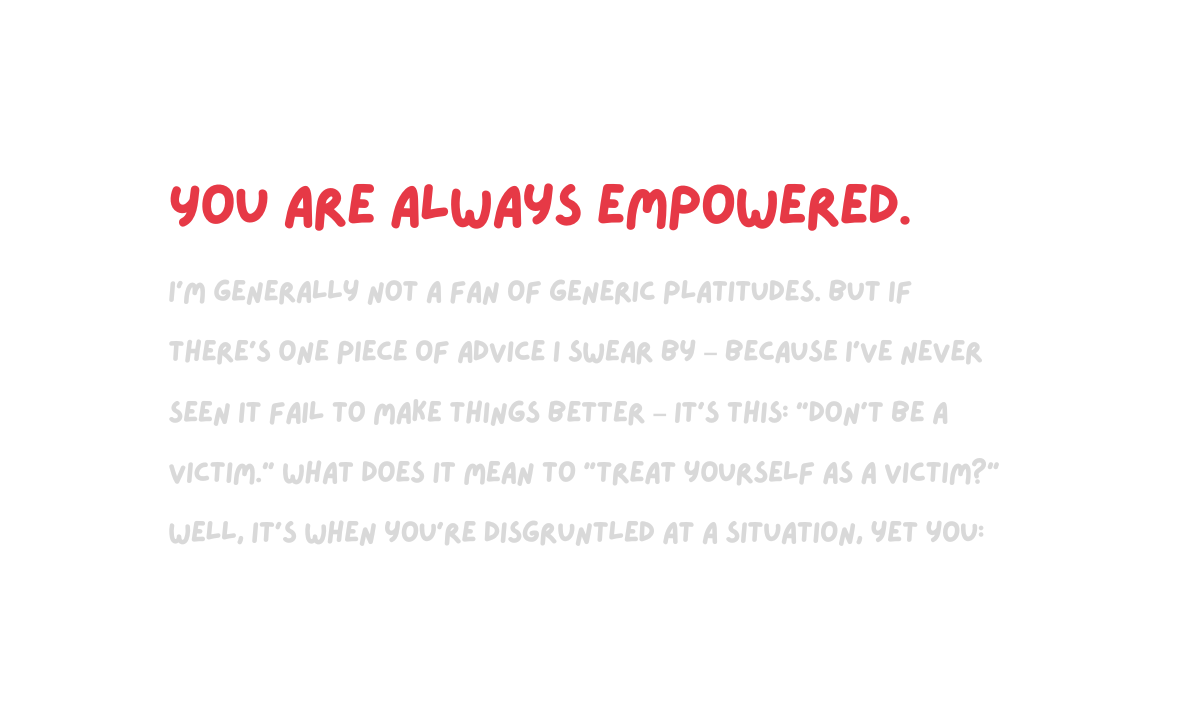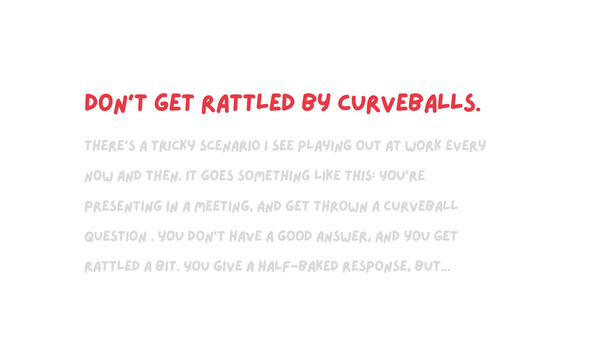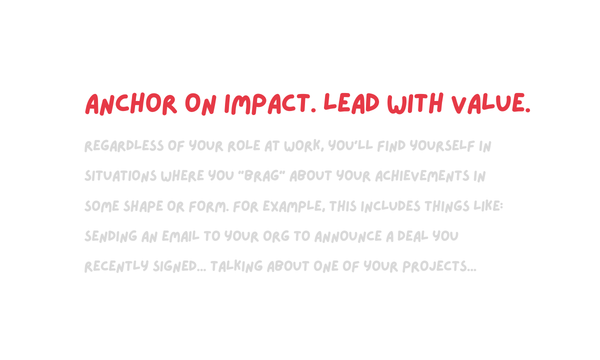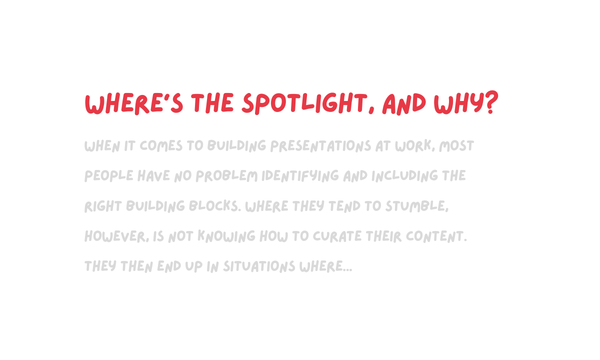Unhappy at work? Don't make this mistake.

👋 Hi! It's Herng. Welcome to my newsletter where I share tips with 5000+ readers on how to outperform at work. New here? Start here.
🔊 Note: I'm building a masterclass to help more people become exec-ready communicators and scale their influence at work! To get early access: sign up for the waitlist here (no commitment needed).
Let me start by sharing 3 stories that happened to me early on in my career.
Story #1: I used to work with a colleague, who had the tendency of swinging by my desk every morning and asking me for project status updates on the spot. It bordered on micro-management and disrupted my work routine heavily.
Story #2: I once worked with a stakeholder who loved giving me project briefs by simply pinging me a couple sentences. The briefs were often incomplete and ambiguous, and made it very difficult for me to figure out what was expected.
Story #3: I used to prepare meeting notes for a stakeholder, who would often message me right before the meeting for additional details. I would then scramble last-minute to find answers. Sometimes I would miss the cutoff altogether.
It turns out that these 3 frustrating stories have two things in common.
The first common theme is this: these weren't one-off interactions. They kept happening over and over again.
Can you guess the other thing that these stories have in common?
👋 Join 5000+ readers and subscribe to Herng's Newsletter for free:
The victim mentality, explained
I'm generally not a fan of generic platitudes. But if there's one piece of advice I swear by – because I've never seen it fail to make things better – it's this:
"Don't be a victim."
And this is exactly the other thing that all three of my stories had in common: I was treating myself as the victim.
What does it mean to "treat yourself as a victim?" Well, it's when you're disgruntled at a situation, yet you:
- ...tell yourself that you are powerless to change things
- ...accept that the situation will simply happen repeatedly
- ...assume that any attempt to rectify will only make things worse
In fact, here's my confession. In the 3 stories I shared above, I actually left out some details:
- Story #1: I was annoyed at being asked to do ad hoc updates. But instead of letting the other person know? The only thing I did differently was to do my updates in a grumpy manner. Otherwise, I continued to oblige.
- Story #2: I was frustrated at how I was getting briefed; it was ineffective and clumsy. But I never gave feedback or suggested alternatives. I would simply ask for more details, and work with whatever response I could get.
- Story #3: I was stressed at getting last-minute pings. But I didn't do anything differently. Every week was simply another gamble: some weeks I got lucky, and some weeks I didn't.
I did not realize it at the time – but I was treating myself as a victim. I was unhappy in all three cases – yet I convinced myself that there was nothing I could do otherwise.
I simply told myself that I just had to play along – and ride it out.
Why do we take on the victim mentality?
To my own credit: while I may have inadvertantly treated myself as a victim in these stories, I was not irrational by any means.
So why did I opt for the status quo instead of trying to fix things? What was my underlying logic?
Well, here are some things I told myself at the time:
- "This person is more senior than me, so I need to defer to them and work in a way that they prefer. Besides, if I try to change things, I'm asking them to cater to me – and that will come off as selfish."
- "I don't want them to hold a grudge if I complain about our working model; it might backfire. The upside I can gain from complaining just isn't worth it."
- "Surely they can sense I'm unhappy through all the signals I'm sending. I'll just wait for them to initiate – then I'll have the 'license' to give feedback."
I didn't realize it at the time, but it turns out that I wasn't alone in having these concerns.
Over the years, I observed many other people rationalize their actions (or lack thereof) the same way – only to also end up also "victimizing" themselves as a result.
And it was only then that I realized why this line of thinking doesn't hold water.
👋 Subscribe for free to get Herng's newsletter directly in your inbox.
Concern #1: "I can't make them cater to me."
It's natural – yet misguided – to think of collaboration as a zero-sum game. But people do it all the time.
What's a zero-sum game? It's when you think that making life better for you has to come at the expense of the other person.
So when there's a power imbalance – most people simply acquiesce. And the status quo continues.
Here's what you have to realize, however:
- It's not about giving and taking. You can make things work better for yourself without making things worse for the other person. But you won't know unless you try.
- The cost of inaction almost always outweighs the risk of trying to fix things. If you're unable to perform at your best (hard to do so when you're unhappy), the implications are much more severe.
Indeed, in these situations, the most dangerous thing you can do is to feed yourself questionable narratives to justify inaction. Because sometimes? The storylines you tell yourself might not even be true.
For instance, imagine that a stakeholder asks you for highly-customized presentation materials for every meeting, and you're unable to handle the workload.
❌ Here's what it means to be a victim:
- "I'm overwhelmed – but I can't say no, because this is a senior stakeholder. I just need to grind it out. But I hope they will cut me some slack once they realize that I'm unhappy and burning out."
✅ By contrast, here's what it means to take ownership:
- You let your stakeholders know that due to bandwidth constraints, you need to prioritize, and you want to align on principles together
- Your stakeholder now also realizes that their asks require significant lift (which they were unaware of previously, as they thought the data was automated)
- They give you their view on which meetings are of the highest stakes, and you manage to find an 80/20 solution together, without really incurring any business risk
This is a hypothetical example, of course. But it just goes to show that sometimes, you just don't know what you don't know – unless you try.
👋 Join 5000+ readers and subscribe to Herng's Newsletter for free:
Concern #2: "I don't want to come off as complaining."
OK fine – then don't complain!
Because here's the thing: You can always raise feedback in a constructive and tactful way. You are misguided if you think that doing so is the same thing as complaining or "being difficult."
(I should know – because this very fear haunted me for years.)
We previously established that one of the worst options is to do nothing. But even if you choose to do something, make sure you do it the right way.
Because you can still come off as a victim, even if you've tried to be proactive, constructive, or tactful.
For example:
- ❌ The "proactive" victim: You proactively flag what's not working, but you don't offer any solutions; it comes off as complaining ("Hey, I really don't like it when my routine gets interrupted.")
- ❌ The "constructive" victim: You offer constructive solutions – but it's centered around optimizing for you, rather than both people; it comes off as selfish ("Hey, I can't get things done effectively if I'm interrupted constantly – I'd prefer updating you on my own timeline if that works.")
- ❌ The "tactful" victim: You polish your verbiage to avoid coming off as whiny or self-centered – but it is disingenuous, and comes off as passive-aggressive instead ("Hey, I'm just wondering... is this how you prefer to get updates? Is this working for you? Just asking, no particular reason...")
A much better alternative? Be proactive, constructive, and tactful – but also genuine:
- ✅ "Hey, I'm thinking through the best way for me to provide timely updates, because I've found that I'm not as organized if I'm doing it on the spot. Do you think we could experiment with letting me put in 3 fixed 15min slots a week, so that there's a bit more predictability, and so that I can ensure my updates are sharp and effective? Let me know also if there are other things we should optimize for to ensure you have the visibility you need."
Remember: raising your hand is only the first step. If you're not saying the right things (and framing them the right way)? You're still being a victim. Just a more vocal one at that.
Concern #3: "I'm bad at conflict. It will just backfire."
If you believe that you're bad at handling conflict, and you would only make things worse by initiating feedback? Fine, I get it.
In fact, I can fully empathize – because I used to be in the exact same shoes. Any type of disagreement made me uneasy; confrontation made me squirm.
And I didn't find an effective solution for it until I received this piece of advice a few years ago, and it worked wonders for me:
"Lead with curiosity."
I explain what it means to approach conflict resolution with curiosity in this deep-dive, but the gist of it is this:
- If you approach any type of disagreement as a negotiation, you're off to a bad start. It simply cannot be about you vs. them. Instead, it should be both of you vs. the problem.
- You also want to park aside the notion of "right vs. wrong" for a moment. Because that's not what you're interested in.
- Instead, you're exploring why two people – presumably equally well-intentioned – can't seem to find common ground. You should be curious to figure out why.
When you allow yourself to be led by this notion of curiosity, you're not trying solve for who's more right (or more wrong).
Instead, you're more interested in fact-finding. You're focused on understanding and reconciling perceptions – rather than negating them.
You're decoupling the arguments from the individuals.
And that's how you can "hack" yourself (in a healthy way) into not treating the situation as conflict resolution anymore.
You'll then feel more empowered to fix the status quo in a constructive, collaborative, and genuine manner.
Quick takeaways
Don't be a victim. Because you are always empowered to:
- Speak up (proactively and constructively)
- Find someone who can help amplify your voice
- Raise your hand if you think you've exhausted all avenues
Just make sure you don't jump to the last step straight away.
Because if you haven't demonstrated extreme ownership in the first place (find out what it means here) – you haven't tried hard enough.


